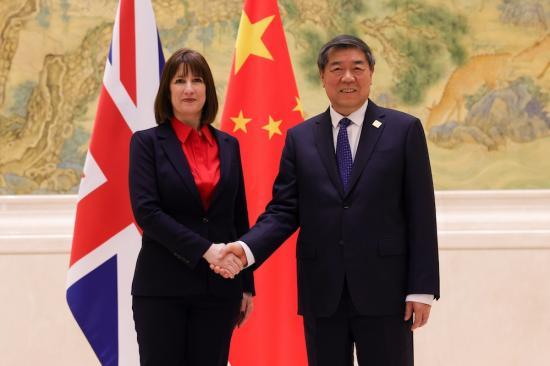Continuing to seek Chinese investment in the UK comes at a heavy political price - Should Have Stayed In the EU
25th May 2025

One major consequence of the UK government's resistance to rejoining the European single market is that it is forced to go around the world seeking trade deals and investment.
Recently, the government has boasted of successful arrangements with India, the US, and some new agreements with the EU. But it has also found itself courting one highly dubious suitor.
Since the chancellor of the exchequer, Rachel Reeves, went to Beijing in January 2025, the government has been focusing much of its attention on China. And while investment from the world's second-largest economy is fairly unproblematic in a few sectors (some services and domestic real estate, for example), other areas are a cause for concern.
Relying on Chinese money to support key sectors such as steel, telecommunications, advanced electronics, power and transport - all vital for Britain's economic and geopolitical security - is potentially dangerous.
Yet it has been going on for years. Efforts to secure funding by a previous Conservative government even allowed state-owned Chinese companies to invest in the UK's nuclear future, despite considerable criticism from the likes of MI5 and the British military.
Then there was the 2017 acquisition by a Chinese state-backed private equity firm of cutting-edge semi-conductor company, Imagination Technologies. Subsequent concerns over the leaking of its intellectual property prompted a parliamentary enquiry into foreign corporate asset-stripping.
British Steel was also a target. Sold in 2019, it is now owned by a private company, Jingye, which in April 2025 moved to shut down operations at its Scunthorpe site by not supplying the raw materials required for its blast furnaces.
In response, the UK government took emergency control of production in a scramble to stop the furnaces from going cold.
That incident should have served as an urgent reminder to the government that it needs to be wary of the effect Chinese companies can have on the UK.
Early signs, however, are not reassuring. Business secretary Jonathan Reynolds commented that Jingye was not acting in the "rational way" he would expect of a company in a market economy.
But the government should know that when it comes to strategic decision-making, Chinese companies do not operate in ways that others consider rational. Put simply, they are not comparable to their equivalents in Britain or other liberal-market economies - because they are effectively controlled by the Chinese Communist Party (CCP).
According to the CCP's data, by 2017 it had established a formal presence inside 92% of larger private companies and 73% of all private companies in China. Those figures will certainly be higher now. And, as with the digital-technology firm Huawei, senior CCP members are often on a company's boards of directors.
So, while Jingye almost eliminated British Steel as a viable company, it can be reasonably assumed that a decision of such strategic and geopolitical importance would not have been taken by Jingye's executives alone. They would have been "guided" by the CCP.
Influence and infrastructure
And of course, it's not just steel production the UK should be concerned about. Chinese ownership now extends across many vital sectors.
There’s the Chinese state-owned company, Beijing Construction Engineering helping to build a new science and innovation park next to Manchester airport. And the private Hong Kong company, CK Infrastructure which owns water companies serving north-east England, Essex and Suffolk.
China Investment Corporation (state-owned) owns part of Heathrow, while China Huaneng (state-owned) operates Europe’s largest battery storage facility in Wiltshire. Meanwhile, wind turbine producer Mingyang (privately owned and reputedly linked to the Chinese military) is the preferred bidder for a new Scottish wind farm, despite being barred from a similar Norwegian development.
All of these companies, irrespective of formal ownership, are likely to be subject to varying degrees of CCP influence and control (comment on the issue from Chinese companies is rare). And successive UK governments have either failed to appreciate the implications of this, or have accepted it as the price of gaining greater access to the Chinese market - especially for London’s financial sector.
This was almost certainly a factor behind China’s involvement in the building of Hinkley Point’s new nuclear power station, and was at the forefront in Rachel Reeves’s discussions with the Chinese government earlier this year.
Separately, Chinese investment in non-strategic sectors is much less controversial. One private conglomerate (Fosun) owns the Premier League side Wolverhampton Wanderers and formerly owned Thomas Cook.
But the lesson from the British Steel fiasco is clear. We are now in a world where the political interests of major states trump the economic interests of their business corporations. Geopolitics takes precedence over geoeconomics.
Consequently, Chinese firms - regardless of ownership status - should be barred from industries vital to the UK’s economic and political security. Anything less risks subordinating British interests to those of the Chinese Communist Party.
Author
Jeffrey Henderson
Professor Emeritus of International Development, University of Bristol
Note
This article is from The Conversation web site. To read it with links to more information go HERE
PHOTO
The Chancellor of the Exchequer, Rachel Reeves, visited China between 10-13 January 2025 to co-host the UK-China Economic & Financial Dialogue (EFD) with Chinese Vice Premier He Lifeng.
Credit: Kirsty O'Connor / HM Treasury
